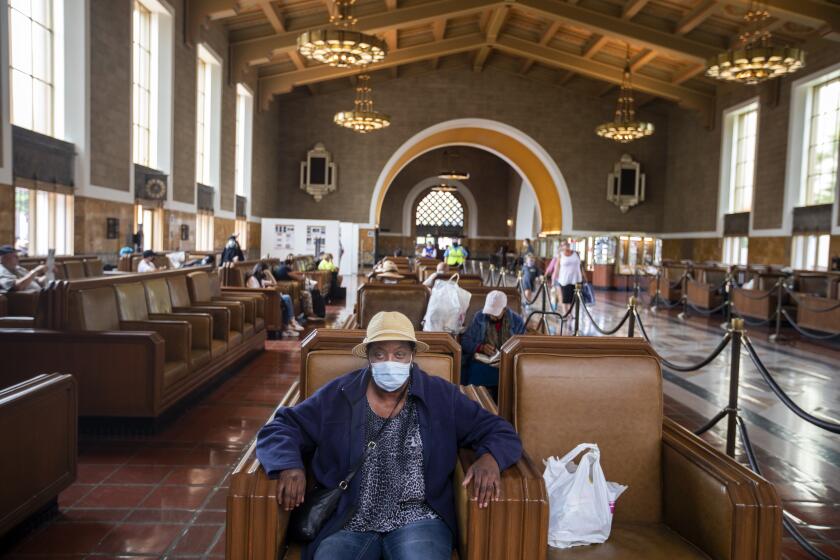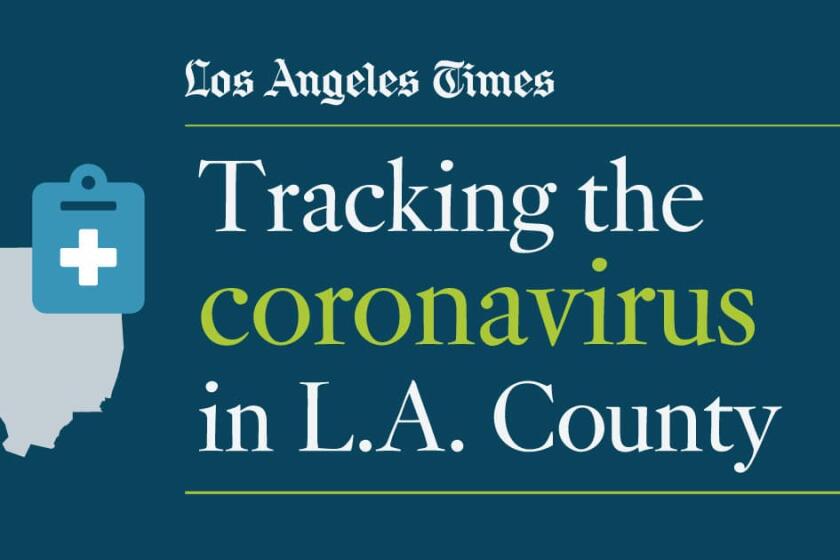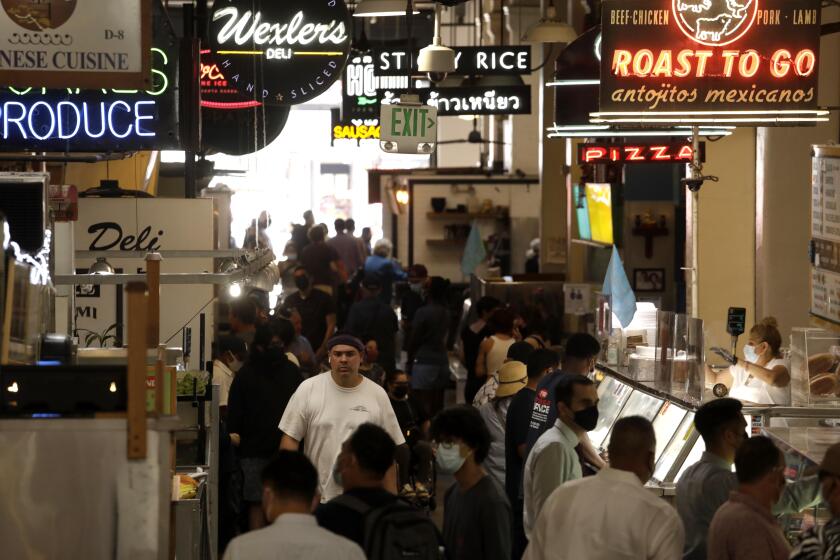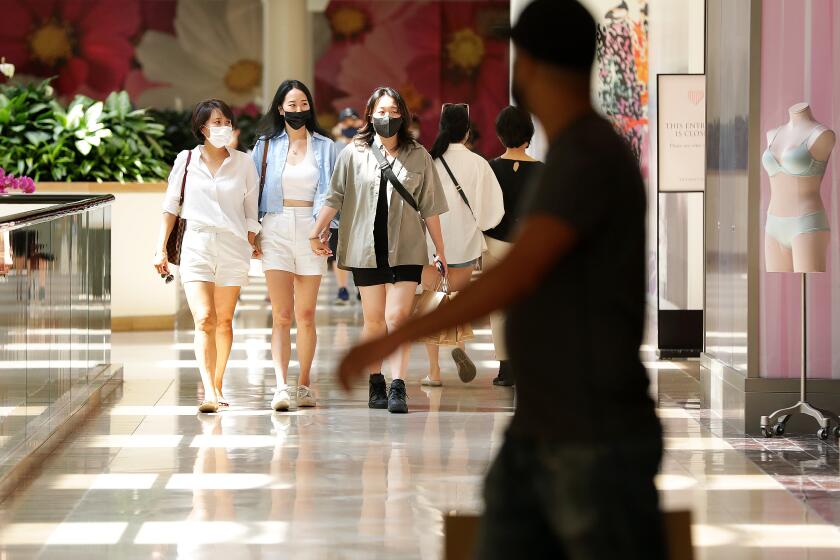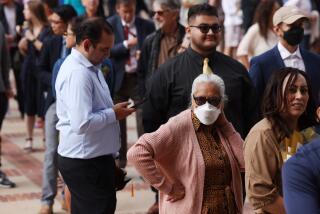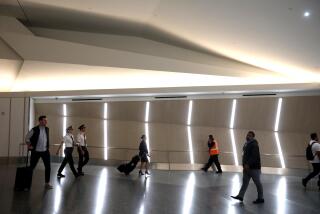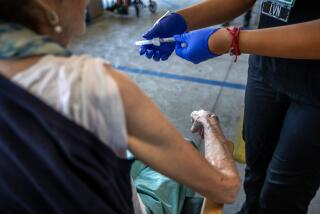Growing alarm over highly contagious Delta variant in L.A. County as cases keep rising
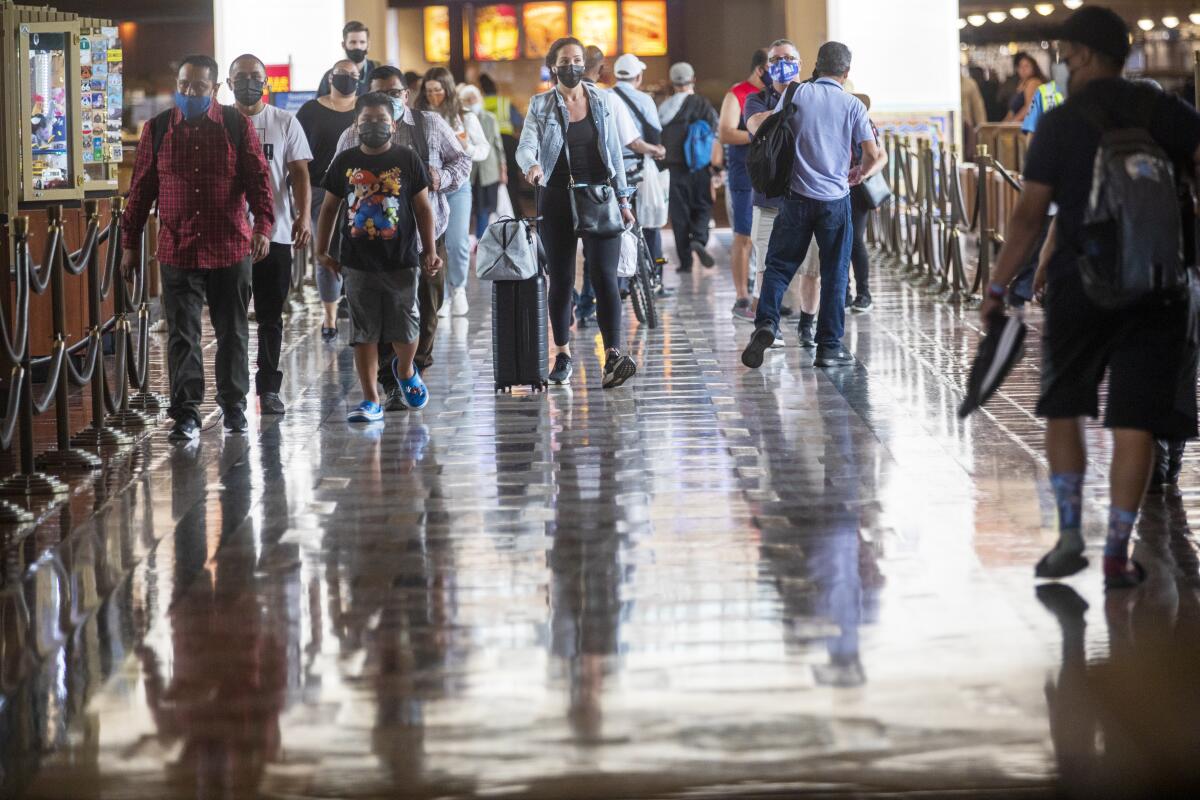
Los Angeles County’s top public health official expressed growing alarm about increasing circulation of the highly contagious Delta variant of the coronavirus, particularly as the region grapples with an uptick in new infections.
While the situation in the nation’s most populous county is nowhere near as dire as over the fall and winter, Public Health Director Barbara Ferrer said the increases seen recently are nevertheless concerning — and are at the heart of this week’s recommendation that even residents vaccinated for COVID-19 should resume wearing face coverings in public indoor settings as a precaution.
“We have enough risk and enough unvaccinated people for Delta to pose a threat to our recovery,” she told reporters Thursday. “And masking up now could help prevent a resurgence in transmission.”
L.A. County averaged about 298 new coronavirus cases a day over the seven-day period that ended Wednesday, an 85% increase from the daily case rate for the seven-day period that ended June 24. Still, the daily case rate is still more than 98% lower than during the peak of the pandemic, when L.A. County was averaging more than 15,000 new cases a day.
COVID-19 hospitalizations have started to tick upward in L.A. County too. As of Wednesday, there were 280 patients with COVID-19 in hospitals in L.A. County, up from 213 on June 19. The latest figure is 97% lower than during the peak of the pandemic.
Average daily COVID-19 deaths in L.A. County remain low, averaging about four deaths a day over the last week.
Only about 50% of Californians, and a similar share of Angelenos, are fully vaccinated at this point.
In a county the size of Los Angeles, that still leaves millions of people exposed to potential future outbreaks.
“Given that we have large numbers of unvaccinated people in Los Angeles County — 4 million in total, including 1.3 million children not yet eligible to be vaccinated — another wave could become a very real possibility,” Ferrer said.
A new coronavirus threat is prompting Los Angeles County health officials to request a voluntary rollback of one of the freedoms fully vaccinated people only recently began to enjoy: no masks indoors.
On June 15, California’s reopening day, Los Angeles County recorded 210 new coronavirus cases, and the proportion of conducted tests coming back positive was hovering around 0.5%.
Both those metrics had doubled by Wednesday, with the county reporting 422 new cases and a test positivity rate of 1.2%.
The seven-day statewide positivity rate also in effect doubled over that same period, according to the California Department of Public Health.
Ferrer has previously said one factor that could be inflating the positivity rate is that schools have let out for the summer, which significantly shrank the number of people undergoing routine surveillance testing. That means the testing pool is not only shallower, but also probably filled more predominantly with residents who are symptomatic or have been exposed to someone with COVID-19.
Over the last week, California has reported an average of 888 new coronavirus cases per day — virtually flat from two weeks ago, The Times’ data show.
The latest maps and charts on the spread of COVID-19 in Los Angeles County, including cases, deaths, closures and restrictions.
The renewed calls for caution out of L.A. County come at a time when the country is gearing up to celebrate the Fourth of July.
President Biden previously set a goal of a dual-purpose holiday — “Let’s celebrate our independence as a nation, and our independence from this virus,” he said in early May — but the fireworks shows and backyard barbecues will instead be held amid the looming threat of Delta.
Fewer than half of all Americans are fully vaccinated.
“Any suffering or death from COVID-19 is tragic. With vaccines available across the country, the suffering and loss we are now seeing is nearly entirely avoidable,” said Dr. Rochelle Walensky, director of the U.S. Centers for Disease Control and Prevention.
During a federal briefing Thursday, Walensky said an estimated 25% of new coronavirus cases sequenced nationwide are now of the Delta variant, and she expects it will eventually become the dominant strain in the country.
Also worrying is that about 1,000 counties, primarily in the Southeast and Midwest, have vaccination coverage of less than 30%.
“As the Delta variant continues to spread across the country, we expect to see increased transmission in these communities unless we can vaccinate more people now,” she said.
With the highly contagious Delta variant of the coronavirus continuing to spread statewide, the Los Angeles County Department of Public Health is recommending that all residents wear masks in public indoor spaces — regardless of whether they’ve been vaccinated for COVID-19.
Even by the standards set by the fast-moving and oft-evolving pandemic, the Delta variant is fairly new.
Much remains unknown about the strain, which was first identified in India and is also known as B.1.617.2.
One open question, for instance, is whether the Delta variant may be more likely to “break through” and infect someone who’s been fully vaccinated.
“It looks like fully vaccinated people may, in fact, be getting infected with the Delta variant at a higher rate than we’ve seen with other variants, so we should pay attention to that and and we should be cautious, particularly in a county like L.A.,” Ferrer said.
She cited the circumstances in Israel, where “although over 60% of the population is fully vaccinated, they are experiencing a surge of Delta variant infections that include a significant number of fully vaccinated individuals,” and India, where “healthcare workers, fully vaccinated with the AstraZeneca vaccine — a highly effective vaccine but it’s not yet used in the United States — showed evidence of transmitting the Delta variant to others.”
Most officials and experts, however, maintain that such cases are rare and that the vaccines remain highly effective at preventing infection and especially at staving off serious illness and death.
“The Delta variant is a threat to unvaccinated Americans and to communities with low vaccination rates. And the best way for communities to protect themselves from the virus is by getting more people vaccinated,” Jeff Zients, who leads Biden’s COVID-19 task force, told reporters Thursday.
California as a whole measures up well in terms of COVID-19 inoculations — with nearly 41 million total doses administered, according to data compiled by The Times.
However, those shots have not gone into arms at equal rates across the state. In seven of California’s 58 counties, more than 60% of residents are fully vaccinated, while in 10 counties, fewer than a third of residents can say the same, The Times’ data show.
“The risk for COVID-19 exposure and infection will remain in California until we reach community immunity with vaccinations,” said Dr. Tomás Aragón, director of the California Department of Public Health and the state’s public health officer. “COVID-19 vaccines provide excellent protection from serious disease, even for the Delta variant.”
COVID-19 vaccines appear to protect against the Delta variant, but there’s real concern about the vulnerability of people who aren’t yet vaccinated.
Circulation of the variant has increased rapidly since it appeared in California.
Delta made up just 1.8% of coronavirus cases analyzed in April, state public health data show.
That proportion jumped to 4.7% in May. As of last week, the variant made up 14.5% of specimens sequenced during June.
On Tuesday, Aragón said the variant currently accounted for about 23% of sampled cases, “and we anticipate this percentage will increase.”
In the United States, L.A. County remains an apparent outlier when it comes to asking fully vaccinated people to mask up indoors.
Though the World Health Organization says people should still “wear a mask, especially in crowded, closed and poorly ventilated settings” even after they’ve been vaccinated, the CDC continues to advise that those who are fully vaccinated don’t need to put on face coverings in most situations.
Dr. Anthony Fauci, the U.S. government’s top infectious disease expert, said Thursday that the broad recommendation remains, “If you are vaccinated you have a high degree of protection, so you need not wear a mask either indoors or outdoors.”
But, he added, local leaders have the flexibility to make recommendations based on the conditions in their communities.
Even with the recent increase, officials were quick to note that L.A. County’s numbers remain well below the harrowing heights seen during the fall and winter surge. And, given the level of vaccine coverage, many experts believe a return to those dark days is unlikely.
But the surest way to stave off that possibility is to break the chain of transmission. Fewer new infections also means fewer opportunities for the coronavirus to mutate in dangerous ways.
“I think we can all agree that it would take a lot of unforeseen events to get us back to where we were last year — and the biggest would be some new variant of concern that the vaccines don’t work against,” Ferrer said. “That would be a disastrous scenario for us, and an unlikely one.”
More to Read
Sign up for Essential California
The most important California stories and recommendations in your inbox every morning.
You may occasionally receive promotional content from the Los Angeles Times.
